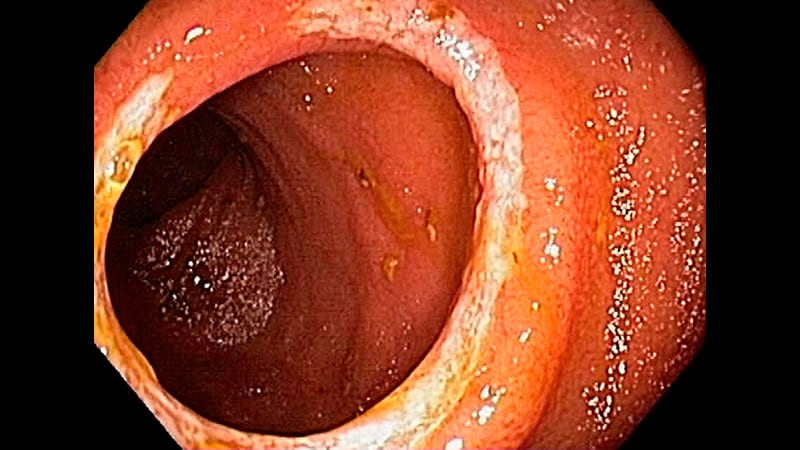Proactive Capsule Endoscopy Strategy in Crohn's Disease
Core Concepts
Proactive capsule endoscopy-guided treatment reduces flares in Crohn's disease.
Abstract
The study presented at the 19th Congress of the European Crohn's and Colitis Organisation (ECCO) highlights the effectiveness of a proactive treat-to-target strategy in Crohn's disease patients using video capsule endoscopy. The research conducted by Shomron Ben-Horin, MD, from Sheba Medical Center, Tel Aviv University, Israel, emphasizes the importance of identifying high-risk patients through capsule endoscopy to prevent clinical flares. The study involved a randomized controlled trial, CURE-CD, which demonstrated that patients with high inflammatory activity, as determined by a Lewis score ≥ 350 in capsule endoscopy findings, had fewer relapses when receiving proactive treatment optimization compared to standard care. The results suggest that tailored treatment based on video capsule endoscopy findings can significantly reduce the risk of disease exacerbation in Crohn's disease patients.
Capsule Endoscopy–Guided Treatment Reduces Flares in Crohn's
Stats
Capsule endoscopy reveals small-intestinal inflammation in over 70% of patients with CD.
Patients with a Lewis score ≥ 350 experienced fewer relapses during the 2-year follow-up.
Clinical flare occurred in 25% of the high-risk proactive group vs 70% of the high-risk standard-care group.
Quotes
"Crohn's disease is a progressive disease, and we don't want flares down the road in a patient that currently feels okay but has underlying inflammation." - Shomron Ben-Horin
"Capsule endoscopy is certainly the most sensitive test we have and lends itself in short order to artificial intelligence interpretation and quantification to make it even more robust." - Maria Abreu, MD
Key Insights Distilled From
by Becky Mccall at www.medscape.com 02-22-2024
https://www.medscape.com/viewarticle/capsule-endoscopy-guided-treatment-reduces-flares-crohns-2024a10003l9
Deeper Inquiries
Should patients in remission be treated more aggressively to prevent future flares?
In the context of Crohn's disease, the decision to treat patients in remission more aggressively to prevent future flares is a complex one that requires a careful balance between the potential benefits and risks of such an approach. The study discussed highlights the importance of identifying high-risk patients through video capsule endoscopy findings and implementing a proactive treat-to-target strategy for this specific group. While this approach showed a significant reduction in clinical flares over a 2-year period, there are considerations to keep in mind. Aggressive treatments may come with adverse effects, high costs, and burden the healthcare system. Therefore, individualized care based on risk stratification and close monitoring is crucial to optimize outcomes while minimizing unnecessary risks and costs.
What are the implications of using video capsule endoscopy to guide treatment strategies in Crohn's disease?
The use of video capsule endoscopy to guide treatment strategies in Crohn's disease has significant implications for patient care and outcomes. This advanced imaging technique allows for the visualization of small-intestinal inflammation in patients who are in clinical remission, providing valuable information that may not be captured by traditional methods. By identifying high-risk patients with inflammatory activity through video capsule endoscopy findings, healthcare providers can tailor treatment plans more effectively, leading to better disease management and prevention of future flares. The study discussed underscores the importance of incorporating this technology into a proactive treat-to-target approach, demonstrating its superiority in reducing clinical flares compared to standard care. Overall, the use of video capsule endoscopy in guiding treatment strategies offers a more precise and personalized approach to managing Crohn's disease, ultimately improving patient outcomes.
How can the healthcare system adapt to the potential cost burden of more aggressive treatments for Crohn's disease patients?
The potential cost burden of more aggressive treatments for Crohn's disease patients poses a challenge for the healthcare system. As highlighted in the study, proactive treat-to-target strategies, guided by video capsule endoscopy findings, may lead to better outcomes but can also be associated with increased costs. To adapt to this potential cost burden, healthcare systems can consider several strategies. Firstly, implementing value-based care models that focus on improving patient outcomes while controlling costs can help optimize resource allocation. Secondly, leveraging technologies like artificial intelligence for interpreting and quantifying capsule endoscopy findings can enhance efficiency and reduce unnecessary expenses. Additionally, fostering collaboration between healthcare providers, payers, and pharmaceutical companies to negotiate pricing and reimbursement strategies for innovative treatments can help mitigate the financial impact. Overall, a multidisciplinary approach that prioritizes cost-effectiveness, patient-centered care, and strategic partnerships is essential for the healthcare system to adapt to the potential cost burden of more aggressive treatments for Crohn's disease patients.
0
